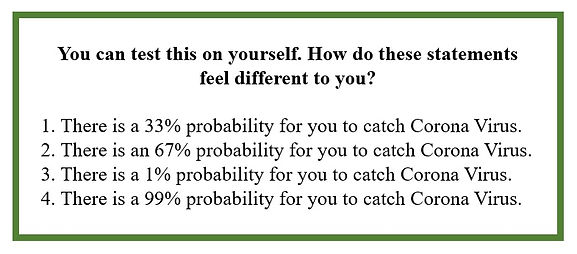Why is Covid-19 creating such a divide among us?
- eterrighena
- Mar 20, 2020
- 2 min read
Updated: Apr 1, 2020

With numbers on the rise all over the world, some people still go to social gatherings and do not wear masks, while others are panic-buying and hoarding toilet paper, and hand-sanitizer. Why is there such a divide in responses to Covid-19?
As humans, we are inherently bad at accurately estimating risks, especially when faced with uncertainty. We have the tendency to assume the probability of an uncertain, unfamiliar risk, such as Corona Virus, at either low or high extremes. In other words, we may feel like it’s either 0% likely or 100% likely for us to catch it, and act according to this intuitive response. Our brains tend to disregard more medium probabilities of the continuum.

Typically, people do not feel a big difference between the first and second statement, but have a strong distinct reaction to the last two. We don’t quite know what 33% or 67% should feel like and how we should respond to this. 1% and 99% is much simpler to process. This can quickly divide us into people who believe that Covid-19 is lurking at every street corner and will get them if they don’t hide, and people who think they are invincible. Neither of these is true to the real risk.
It is difficult for our brains to identify the probability of a risk. Thus, when faced with the potential threat of Corona Virus, we may base our decisions on our emotional response. If our fear system spikes at the thought of Covid-19, we may be led to largely over-estimate the risk. We may respond with panic and desperately try to regain control over our feelings and the situation by doing whatever we can to feel safer. If the idea of Covid-19 does not cause our fear system to spike, we may be led to largely under-estimate the risk. We may assume that we will not catch Corona Virus or if we did, the symptoms would be mild, and thus, it’s not that big a deal to follow health recommendations.

How our fear system responds depends on our previous experiences– maybe we have had loved ones fall ill before which has sensitized us to worrying about them, maybe we have been sick ourselves and fear going through that again. Vice versa, maybe we have overcome illness and feel particularly confident about our abilities to do that again. Or perhaps ignoring a threat is something we learned as a coping mechanism to regulate anxiety.
We can compensate for our flawed probability of risk estimations by making the effort to adjust our emotional, intuitive decisions with help of our analytical brain regions. This can include seeking reliable sources of information on Covid-19, listening to pandemic experts, and making the effort to understand how to appropriately respond to minimize risks to ourselves and others without going over-board into panic behaviour. It can also include identifying our values and acting in accordance with these. For example, we may wish to protect those more vulnerable to ourselves, and can use these values to guide our behaviours. This way we can make more measured decisions on how we respond, rather than letting our past experiences, feelings, and risk biases make decisions for us.




Comments